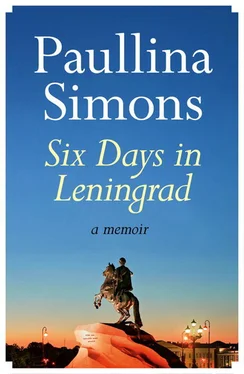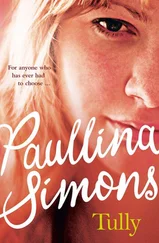And the smell of fresh water from the canals of Leningrad. Arguably fresh may not be the best term for it, but the scent flowed through the city and everywhere it rose up to meet me, attaching itself permanently to my insides.
Russia was like a hard dream from which I could not wake up. When I was young I used to have a recurring nightmare in which I was being chased by a cow on railroad tracks. Every time I turned around, the cow was behind me. I’d speed up, run with a dreamer’s ineptitude, tripping, falling, slowing down. Then I’d turn around, and there was that cow, just a few railroad ties behind me.
“Kevin, what am I?” I asked him one evening after the kids had gone to sleep, not, may I say, willingly. “When you have to describe me to people or in your own head, how do you describe me?”
“Well, first and foremost, you’re my wife.”
“Okay, and then?”
“Then you’re… well, you’re…”
“That’s what I thought,” I said. “I can’t describe myself either. What am I? Am I an American? Am I Russian?”
“Yes!” he said triumphantly. “I got it. You’re a Russian-born American author who also happens to be my wife and the mother of my children.”
“Okay, good,” I said.
I decided I have lived in too many places. When we came to America, we lived in Woodside, Queens, then in Kew Gardens, Queens, then in Ronkonkoma, Long Island. I lived at Stony Brook University, in one dorm, another dorm, another dorm, then in a house in Port Jefferson, then in a university in England. I lived in an apartment in Lawrence, Kansas, back in one dorm in England, another dorm in England. A house in Ilford, a house in Birmingham, a house in Dagenham, then back to the States. I lived in one apartment in Forest Hills, another apartment in Forest Hills, a third apartment in Forest Hills, then a house in Lake Ronkonkoma, a rented house in Texas, and finally here, in my yellow stucco home. That’s nineteen different places since the time I left Russia. About one a year.
But before I was ten, I lived in only one place and that was our apartment on Fifth Soviet, and I spent my summers in only one place, and that was Shepelevo, and when my spirit can’t find any solace, that’s where I return, because it’s the only place I can call home.
I walked into my dream and kept walking with my Leningrad in front of me and behind me and all around me.
I wasn’t carrying Russia with me. It was carrying me.
I tried to settle back into my life. How lucky I was that I had one and didn’t have to make one up from scratch. In this life there was no time and no place for feelings of raw displacement. The brass weather stripping outside my balcony door had been ruined by paint thinner, and the blower above my cooktop made a racket when it was turned on. One of the bathroom door handles broke, the garage door would not close, the Texas prairie wind blew through the gaps in my warped front door and made the cavernous formal living areas cold. I made time for these details. I didn’t make time to cook blinchiki or think about Yulia or figure out who I was. Who I was didn’t matter anymore because the black Texas clay dirt was getting in the dog kennel when it rained and something had to be done about that.
I kept the rubles from Russia in a cubby hole in the mud room. Finally I couldn’t stand looking at them anymore, so I sent them to Ellie and Anatoly, along with the bottle of Tressor.
It was tough for Ellie before, but now that the ruble had been devalued by half and half again, how much was going to be left for her tomatoes and her borsht and her blinchiki?
I sent Viktor’s sons new Dallas T-shirts. To get his zip code, I miscalculated the time difference backwards instead of forwards. I thought I was calling him at nine in the morning but it turned out to be two in the morning. Big difference. Viktor’s wife must have been thrilled that some woman from America was calling her husband at that hour of the night. “Oh, but honey, she is going to send our boys T-shirts.”
Television news one night carried a picture of a well-dressed man from Leningrad. He was in his fifties, and he was wearing a suit and tie. He lived in Leningrad, but on this particular evening, he left his job at five o’clock, a job at which he had not gotten paid in six months, and he took a tram to the outskirts of the city. At the last stop, he got off and rode the electrichka to a town near Leningrad called Kolpino, where he went to a local cafeteria and stood in line. Back in Leningrad he had heard that in this cafeteria in Kolpino they were serving soup. So he stood in line that evening to get some soup to bring home to his family. The picture on the news was of him standing in this line. He could have been in 1941 Leningrad with the food storage warehouses having just been burned by the Germans and mass starvation weeks away. It was agonizing to see his face.
The War was not in the past, it was everywhere you looked, just as communism was everywhere you looked. War was the baggage we all carried with us: every heartbreak, every longing, every job, every neglect, every happiness, and we went forward into the future with the wounds of communism on one shoulder and the wounds of war on the other. We went to our outhouse and we hoped that our cucumbers wouldn’t have bitter skins this year, that our chicken was not going to get worms and die because then we wouldn’t have eggs.
We hoped for perch, and we hoped that the men who came to clean the outhouse did not ask for more than a liter of vodka because it was all we had. And when, upon leaving, all they asked for was what we had, we thought we were lucky.
And then with our heads bent, we went to get a loaf of bread from the lady near the metro and coming back we said, let me just walk once more among the graves of my brothers, my soldiers. Let me bow my head and let the tears in my eyes not spill over because I don’t have a hand to wipe them. Maybe Yuliy Gneze and I had more in common than I realized. Maybe he walked through Piskarev every day because he too couldn’t believe he had lived.
You’d think that Russians would be more in need than Americans of artificially induced stupor, and vodka certainly did take care of the edges. In between shots, or even during, they read books and tried to write themselves; they baked blueberry pies, they had children, they grew their vegetables, they caught their fish, they fixed what they could and left what they couldn’t. Every once in a while someone went overseas and brought back perfume or make-up or perhaps a leather jacket. They continued to live the best they could even if it meant going to Kolpino for some soup in your best suit.
It was only too right that nothing could grow on the small square of land at Nevsky Patch. The soldiers are still crying, turning in their graves, shouting, is this what we died for, what we stood on the dark Neva for? Is this it? Their tears wash away their bones, but not far enough away, while we shrug, pulling at our gray hair, and walk on.
I walk onto my balcony in Texas. Alla goes back to the Prospekt of Five-Year-Plans. Svetlana haltingly sings, Shine Shine My Star as she stands in the kitchen crying into the bowl of ground beef for stuffed cabbage, thinking about St. Petersburg, Florida, singing arias through the palm trees.
Ina continues to rejoice that she got two large rooms for her family. She’s in those two rooms till the end of her life, and she thanks God.
The Likhobabins go to Babushka’s grave, pulling out the weeds, putting some fresh flowers on it, and then stroll arm in arm to the Gulf of Finland, to their boat.
Yulia pulls the curtain closed over the Prospekt of Veterans where she has lived since 1968 and goes to take care of her infant girl, hoping that she can get the baby’s father to move in with her one day. He does eventually, and then she hopes that if he sticks around long enough maybe he can help her bring the dacha in Shepelevo to fighting form.
Читать дальше












